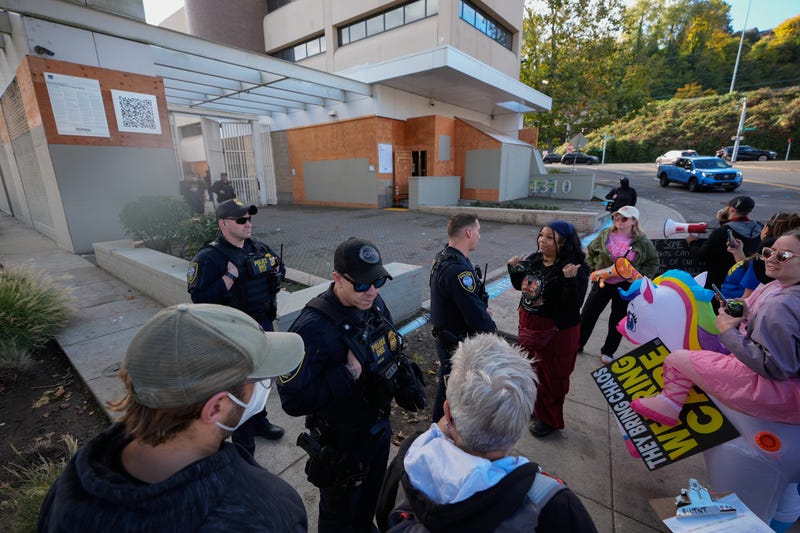
PORTLAND, Ore. (AP) — A federal trial over whether President Donald Trump can deploy the National Guard to Portland, Oregon, began Wednesday, with a police commander describing on the witness stand how federal agents at a U.S. Immigration and Customs Enforcement building repeatedly fired tear gas at nonviolent protesters.
Attorneys for the city and state are attempting to block Trump from deploying troops by arguing that they aren’t needed to enforce the laws and that the president should not be allowed to use the military to remedy a situation worsened by federal agents.
The trial is expected to last three days and to include testimony from federal officials as well.
Portland Police Bureau Cmdr. Franz Schoening called federal agents’ actions at the building, which has been the site of mostly small protests since June, “startling.” State and federal law prohibit police agencies from using munitions, including tear gas, the way the federal officers have, Schoening said.
City police officers themselves had been tear-gassed and forced to pull away from the scene, Schoening said.
At one point during a larger protest on Oct. 18, a federal agent fired smoke or tear gas munitions from a 40-millimeter (1.57-inch) launcher. One skipped off the driveway in front of the building and landed on the roof, where other federal officers were posted. Those officers then responded by firing further munitions at protesters, Schoening said.
“We didn't see any violent conduct or behavior that would have precipitated that use of force. It appeared to be triggered by the federal officer's deployment of that munition,” Schoening testified. “Our officers were in close proximity and were struck by federal munitions.”
U.S. District Court Judge Karin Immergut, a Trump appointee, is presiding. She previously issued two temporary restraining orders in the case, blocking the troops pending further litigation. She found that Trump had failed to show he had met the conditions set out by Congress for using the military domestically. She described his assessment of Portland, which Trump called “war-ravaged,” as “simply untethered to the facts.”
One of Immergut's orders was paused last week by a three-judge panel of the 9th U.S. Court of Appeals. But late Tuesday, the appeals court vacated that decision and said it would rehear the matter before an 11-judge panel.
The complex case comes as Democratic cities targeted by Trump for military involvement — including Chicago, which has filed a separate lawsuit on the issue — are pushing back. They argue the president has not met the legal requirements to deploy troops and doing so would violate states’ sovereignty.
The administration argues that it needs the troops because protests have impeded law enforcement operations, including blocking the building's driveway and hindering federal vehicles from exiting or entering.
Portland’s ICE building outside downtown has been the site of nightly protests that peaked in June when police declared one demonstration a riot. Smaller clashes have occurred since then, and federal officers have fired tear gas to clear crowds, which sometimes have included counterprotesters and livestreamers.
U.S. Justice Department attorney Eric Hamilton told the court there has been violence against federal personnel and property throughout the summer, and that “agitators have used violence and threatened violence.”
He also suggested the Portland police have deliberately misread the state's sanctuary laws — which prohibit law enforcement agencies from participating in federal immigration enforcement — as preventing them from removing trespassers at the ICE building.
In a trial brief, the Trump administration called Portland authorities “unhelpful and at times hostile.”
“The record is replete with evidence of the PPB failing to provide assistance when federal officials have requested it,” Justice Department attorneys wrote.
The Trump administration argues that it has had to shuffle Department of Homeland Security agents from elsewhere around the country to respond to the Portland protests. That is evidence, it argues, that the president has been unable to enforce the law with regular forces — one of the conditions set by Congress for calling out the National Guard. It has also characterized the protests as a “rebellion” or “danger of rebellion” — another of the conditions.
The police say they have made arrests when crimes have been committed, but that they also must respect protesters' First Amendment rights.
Communication between local and federal authorities worsened as federal agents surged to the building “without a clear command and control structure,” the state and city said.
“To list just one illustrative example, at one point pepper balls were shot in the direction of a PPB officer,” the trial brief said. “When confronted, federal officials responded, ‘help or get out of the way.’”
In Chicago, police officers have similarly been exposed to tear gas deployed by federal officials against protesters.
___
Johnson reported from Seattle.